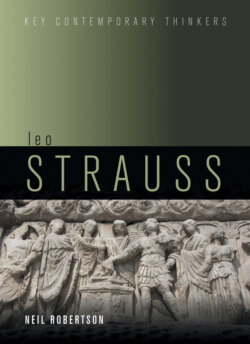Читать книгу Leo Strauss - Neil G. Robertson - Страница 14
The Critique of Modernity
ОглавлениеThe final theme we will explore is Strauss’s explanation of the history that has led to what he sees as the modern crisis. The first thing to understand is that history is, for Strauss, fundamentally a history of ideas. The modern world, or “modern project” as he sometimes calls it, is not primarily a result of social, economic, or other historical causes; it is primarily the work of changes in thought, and above all the work of changes in political philosophy. The most fundamental change was a shift in the meaning of political philosophy in the sixteenth and seventeenth centuries so that it was no longer seen to be a life in pursuit of theoretical knowledge, but became dedicated instead to the alteration of political reality. For the modern, knowledge became no longer the knowledge of what is, but of how to change what is. In short, political philosophy became dedicated to effecting historical change. More specifically for Strauss, in the modern project historical change was aimed at constructing a world dedicated to fulfilling human needs and purposes.
Strauss came to see the modern project as consisting of three stages or waves that bring out a progressively deeper radicalism. We will have a chance to explore this development in detail in chapter 5. But at this stage, the general point to see is that, according to Strauss, modernity began with a break from the pre-modern made by political philosophy, and came to a kind of conclusion in the crisis of the moral nihilism and relativism of twentieth-century life. For Strauss, this places us, as inhabitants of a modern or postmodern world, in a terrible dilemma. We have lost our capacity to orient ourselves morally and politically. We cannot simply turn back to an earlier moment in modernity; its history has shown that modernity generates its own undoing. Even if we find a way to recover the standpoint of natural right through a study of classical political philosophy, for Strauss it is hard to say how that can and should guide us in a world that is no longer classical. As Strauss stated, “only we living today can find a solution to the problems of today” (CM 11).
Strauss argues that, rather than a “solution,” what emerges from the insight that fundamental problems are irresolvable is a way of living with the problems: the recognition that moderation and practical wisdom are the proper standards of political life. Nature can function as a kind of guiding star in terms of natural right, but it does not provide an ideological map. For Strauss, one of the marks of the modern project is its tendency to become ideological, to move toward a fixed determination of the workings of the world. In Strauss’s mind such ideologies tend toward reductionism. At the heart of Strauss’s political philosophy is an effort to liberate thinking from reductionist or ideological accounts of politics and of the human more generally. For him, it is only when reductionist tendencies are resisted that the fundamental problems can emerge – and that political philosophy will be able to become, as Strauss called it, “first philosophy” (CM 20).
